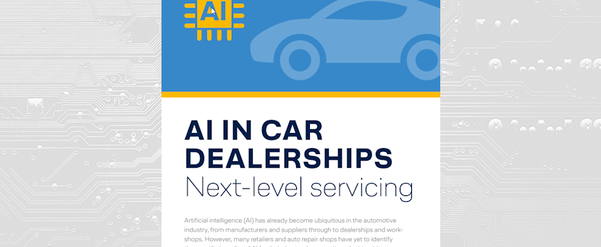For German drivers, the matter is clear: 75 percent of them expect modern car dealerships to use AI. This is the result of a recent survey conducted by Lufthansa Industry Solutions (LHIND) among over 1,000 car owners in Germany. In their new whitepaper, AI in Car Dealerships: Service Next Level, LHIND's experts explain how AI can generate real added value in the service business.
Norderstedt, November 25, 2025 – Respondents hope that AI will make it easier to schedule appointments, reduce waiting times, and improve fault diagnosis and repair quality. Interestingly, eight out of ten respondents said that the quality of service at a car dealership directly influences their choice of car brand. "The industry is facing profound changes, from the transition to electric mobility to new sales models and digitized customer interfaces. However, the situation in service is often less in focus but equally critical,” says Nils Büring, Head of Mobility at LHIND. "Not only are dealers losing potential revenue in maintenance and wear-and-tear areas due to e-mobility, but they also have to meet the expectations of digitally savvy customers — with processes that are often not designed for this purpose."
LHIND's new whitepaper, "AI in the Car Dealership: Service Next Level", addresses this issue by combining project experience, use cases, market observations, and the results of a Germany-wide survey of over 1,000 drivers. "Many dealers are interested but overwhelmed. Even though the market is flooded with AI promises, there is often a lack of concrete references to their own businesses,” says LHIND Business Manager Florian Meier. "Our experience shows that, as soon as we examine the dealers' processes together and identify specific use cases, acceptance increases enormously."
From Bottleneck to Solution: AI in Everyday Workshop Life
A systematic review of the entire service process is the starting point, covering everything from acquisition and scheduling to repair and aftercare. Based on this review, the whitepaper presents eight practical use cases for AI, including data-driven capacity forecasts, automated vehicle acceptance via image analysis, intelligent chatbots, and AI-supported spare parts logistics.
The end customer survey included in the white paper shows that drivers are generally open to the use of AI in car dealerships. They also have concrete ideas about what they hope to gain from it.
- 83 percent are willing to submit images/data for an AI-supported initial assessment
- 78 percent can imagine using AI to schedule appointments for inspections, MOTs, etc.
- 44 percent hope that AI will make scheduling appointments easier
- 41 percent believe AI will improve fault diagnosis and repair quality
The survey revealed that excellent service directly impacts a car brand's image. For example, 81 percent of drivers said excellent service influences their choice of car brand. Service quality will undoubtedly continue to depend heavily on the people in car dealerships and repair shops: 92 percent of respondents said it is important, if not very important, that human employees continue to play a role in AI-supported processes.

